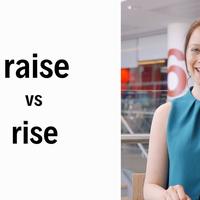'Raise' vs 'Rise' - English In A Minute - YouTube
„Raise“ vs. „Rise“ – Englisch in einer Minute – YouTube
Raise' vs 'Rise' - English In A Minute - YouTube
Raise' vs 'Rise' - English In A Minute - YouTube
レイズ」vs「ライズ」 - English In A Minute - YouTube
'올리다'와 '상승하다' - 1분 안에 끝내는 영어 - YouTube
'Raise' vs 'Rise' - Inglês num minuto - YouTube
'Raise' vs 'Rise' - Английский за минуту - YouTube
"Yükselt" ve "Yükselt" - Bir Dakikada İngilizce - YouTube
"Піднімати" vs "підніматися" - англійська за хвилину - YouTube
“Raise” 与 “Rise” - 一分钟英语 - YouTube
'Raise' 與 'Rise' - 一分鍾英語 - YouTube
Hi, I'm Sian for BBC Learning English.
Hallo, ich bin Sian von BBC Learning English.
And today, we're going to look at the difference
Und heute schauen wir uns den Unterschied an
between raise and rise.
zwischen steigen und steigen.
So raise and rise both refer to something going up,
Erhöhen und steigen beziehen sich also beide auf etwas, das nach oben geht,
つまり、raiseとriseはどちらも何かが上昇することを意味する、
but there's a difference in how we use them.
aber es gibt einen Unterschied darin, wie wir sie verwenden.
しかし、その使い方には違いがある。
Raise always needs a direct object
Raise braucht immer ein direktes Objekt
Raiseは常に直接目的語を必要とする
올리기에는 항상 직접 객체가 필요합니다.
– so if you raise something, you move it up.
– Wenn Sie also etwas erhöhen, verschieben Sie es nach oben.
- だから、何かを上げれば、それを上げることになる。
- 따라서 무언가를 올리면 위로 이동합니다.
For example: I raise my eyebrows when I'm surprised!
Zum Beispiel: Ich hebe meine Augenbrauen, wenn ich überrascht bin!
例えば:驚いたときに眉を上げる!
And it doesn't have to be literal – so:
Und es muss nicht wörtlich sein – also:
文字通りの意味である必要はない:
문자 그대로의 의미일 필요는 없습니다:
The government plan to raise taxes.
Die Regierung will die Steuern erhöhen.
政府は増税を計画している。
정부는 세금을 인상할 계획입니다.
Don't forget this is a regular verb, so the
Vergessen Sie nicht, dass dies ein regelmäßiges Verb ist, also the
これは通常の動詞であることをお忘れなく。
이 동사는 정규 동사라는 것을 잊지 마세요.
past and past participle are both raised.
Vergangenheit und Partizip Perfekt werden beide erhoben.
過去と過去分詞の両方が上がる。
과거형과 과거 분사가 모두 올라갑니다.
But with rise, there's no direct object.
Aber mit Aufstieg gibt es kein direktes Objekt.
しかし、ライズには直接目的語がない。
So if something rises, it goes up or increases by itself.
Wenn also etwas steigt, steigt oder steigt es von selbst.
つまり、何かが上昇すれば、それ自体が上昇する、あるいは増加する。
따라서 무언가가 상승하면 저절로 올라가거나 증가합니다.
The sun rises at 6 a.m. at the moment.
Die Sonne geht derzeit um 6 Uhr auf.
現在、日の出は午前6時だ。
Careful, this is an irregular verb
Achtung, das ist ein unregelmäßiges Verb
これは不規則動詞です。
so the past is rose and the past participle is risen.
also ist die Vergangenheit auferstanden und das Partizip Perfekt auferstanden.
だから過去はroseで、過去分詞はriseである。

